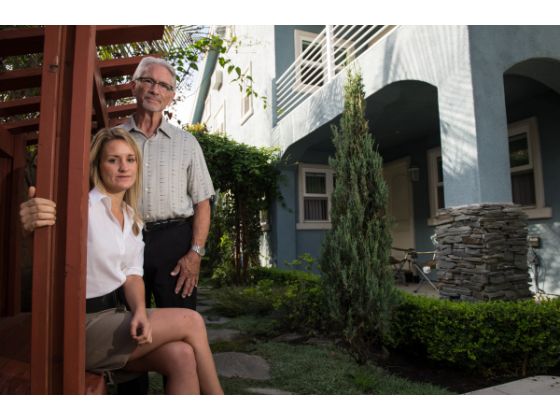By SAMANTHA DUNN / ORANGE COUNTY REGISTER
It’s not a happy story, how Erin Butler found herself living in a “moldy garage” in Fountain Valley, working two minimum-wage jobs, fighting to stay sober and eking out enough money to take a class at a community college.
It involves a father who doesn’t deserve the title and a mother who “tried her best but just wasn’t cut out to be a mom.” Butler was bounced around, eventually “kind of left to my own devices.” She graduated from a continuation high school “barely,” she says.
And then there were the drugs. And then that job dancing – and we’re not talking Joffrey Ballet. “I had less than good judgment,” she says evenly.
“I was trying to get sober, and the only way I could do it was if I quit my job. I did. I didn’t have any job skills so I started working minimum wage, and ended up in the moldy garage,” says the soft-spoken blonde, age 25, who today looks like the all-American girl.
The fact that Butler is now a sophomore at Golden West College in Huntington Beach, with aspirations of getting into UCLA’s law school, has everything to do with a man named Dave Bishop, who in the past 22 years has shepherded lost, troubled young women onto the path of success through the organization he founded, Pathways to Independence.
To say that the program gives these young women financial support so they can learn a trade or go to school and become self-supporting doesn’t really even begin to explain what Pathways does. We’re talking about girls who have lived the stuff of nightmares. Bones broken by alcoholic parents. Spirits scared by incest. Rape. Homelessness. Foster care. The litany of what they have suffered is incomprehensible to any good parent who has ever loved a child.
More than being given money, “they get parented, perhaps for the first time,” explains Sharon Dickson, a therapist in Santa Ana who has volunteered for the program for more than a decade. “Clients,” as they are called, receive not only paid tuition and housing in one of the two apartment buildings the foundation owns or a stipend for rent elsewhere, but also a car if they don’t have one, a mechanic to keep the cars running, a doctor, a dentist, and a therapist, as well as a mentor. They are held accountable with progress reports, maintaining passing grades, and attendance reports from their therapists.
“He’s a principled man. If you have him in your corner, you have been given a tremendous gift in life, but he is not a push-over,” notes Dickson. “I’ve seen him say, ‘I love you to death, but if you don’t do these things, I will love you right out the front door.’”
The result is an 80 percent graduation rate and alumni who have become bank tellers, teachers, social workers, lawyers and good mothers who, finally, have broken the cycle.
And it all stems from Dave Bishop and his faith in second chances.
“Everybody deserves a do-over in life. Just because you didn’t do well before doesn’t mean you won’t now,” a college dean once told Bishop at a time in his life when he was discouraged, and it seemed like things would never go his way. He’s never forgotten it.
Naturally shy and introverted, Bishop says he was “a mediocre student in high school, with little self-confidence.” He went to a seminary – “that wasn’t so good,” says the soft-spoken Bishop – and when he got out, he was drafted for the Vietnam War. After serving in the military for three years, he came out with a drinking problem and no skills to speak of, and wound up working as a part-time janitor at a school.
Things did turn around for him. He sobered up – got into a 12-step program and stayed there. The principal at the school where he worked saw promise in him, and encouraged him to get a teaching degree. He became a teacher, then for 22 years worked as a school principal in the Los Alamitos district, and for five more years he was an assistant superintendent.
Then an opening came up to be a principal at a continuation high school. A friend was retiring from the position. “I went in to see him and he leaned back in his chair and said, ‘You know Dave, you’d like my job. Everybody thinks these kids are a bunch of hoodlums. They’re not. They’re lost. They’re misfits. They’re interesting. They’re fun.’ I took that job for eight years.”
And it was there he started to see that while everybody might deserve a second chance, few got them. When one of his talented students, a teen single mother named Monica from an alcoholic home, was slipping closer to welfare and getting into a hopeless cycle, despite her best efforts at working minimum wage, he told his wife at the time that when he retired he’d like to dedicate his time to helping kids like Monica.
His wife said, Why wait?
Monica went on to a career at Union Bank, and a goodwill gesture that initially came out of the Bishops’ pockets has today become a $1 million-a-year nonprofit that has supported 300 young women to date; 45 are current clients. The program also initially funded young men, too, but Bishop says the girls’ needs were always more pressing.
“Women are victimized way more than people realize to this day,” says Bishop, the father of two grown boys and one girl adopted as an adult from the program. “It’s like we are under this illusion as a society that we went through the ’60s and ’70s and we have all evened up now. No, that’s nonsense. How many battered men’s shelters are there?”
The program pays two part-time staffers to handle paperwork, but there are hundreds of volunteers – including Bishop himself. Seeing the success of young women like Butler is payment enough, he says. “I suffered with depression for a good part of my life, but about 20 years ago it left me. Coincidental?”
Bishop measures compensation in statements like Butler’s: “I’m happy. I started waking up in the morning not waiting for the other shoe to drop. Somewhere along the line, I started smiling and laughing. I felt like a human being.”
Says Sharon Dickson: “When these girls succeed – when they cut their hair, get a C plus – their success is his reward. Their change, their evolution is all he really wants, nothing other than to see them become what God created them to be.”
That’s not to say there isn’t struggle.
“Our wait list is a mile long. I need an extra mil to help another 50,” says Bishop, who dreams of setting up a blueprint so the program can be replicated across the country, and beyond. “You meet another Erin, then we lose them before we can get them in. That hurts a lot. That is the worst part of it.”





